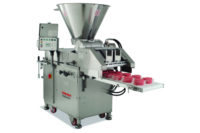Are there antibiotics in my meat? Should I be afraid of genetically modified organisms? How is food production impacting our environment? Where are ingredients sourced?
Decades ago, we gave little thought to our food. But today, despite food being safer, more affordable and more available than at any time in human history, we’re increasingly skeptical and critical of today’s food system. It’s not surprising.
Food production doesn’t look like it used to. Over the past 40 years, food and agriculture companies and farms have consolidated, integrated and industrialized — they’ve become “big.” And in the minds of many, big is bad.
Trust research at The Center for Food Integrity (CFI) consistently shows a “big is bad” bias — a belief that mass production creates more opportunity for error, that industrialized food production is inherently impersonal and that big companies will put profit ahead of public interest every time.
The latest research from CFI’s Illuminate Digital Cultural Insights sheds additional light as consumers consider sustainability factors. Consumers are seeking clearer information about their food, especially protein sources. They believe a lack of transparency around ethical protein sources makes it difficult for them to be sure they are eating sustainably. They also want to know about labor practices for food and agriculture companies. They believe a human-centered approach to sustainability requires a tangible commitment to promote a thriving future for everyone.
It’s a phenomenon driving change in the food system. We all want and deserve to know who’s producing our food — a farmer or food company that we believe is committed to doing the right things for people, animals and the planet, not just the bottom line.
Layer on an avalanche of conflicting information, and it’s no wonder we question whether we should trust our food.
Innovation angst
While new technologies can help farmers grow the food we need using fewer resources, these technologies are causing angst, too. The sentiment was expressed during a CFI consumer panel where all participants indicated they avoid foods containing genetically modified organisms (GMOs).
The moderator asked if their opinion about GMOs would change if, for example, they knew the technology could be used to introduce a naturally occurring gene from an arid plant to create corn that could grow using less water — not only resulting in the use of fewer natural resources but allowing corn to grow in drier climates where populations couldn’t grow their own food before.
One panelist replied, “I find it hard to believe that scientists would spend time and money to use the technology to help something grow faster and easier, more than for profit.”
Seeds created with new technologies are developed to use less water and fewer pesticides, provide enhanced nutrition and grow in changing climates. But that same technology causes some of us to question the motives of “big food.”
We love innovation when it comes to our smartphones, cars and televisions, but not necessarily when it comes to our food — food that we’re putting in our bodies and feeding our children. There’s nothing quite as personal.
Innovation and technology will allow us to meet one of humanity’s most basic needs — safe, accessible, nutritious food — while protecting our planet. But if the food industry doesn’t step up to earn trust, the public will continue to push back and perhaps delay or stop progress in its tracks.
We deserve transparency
We’re living in an era of unprecedented disruption in the food system as technology and consumer demand drive rapid change. The food system is working diligently to provide us with what we want and in a sustainable way. It’s a delicate balance.
Consider the push for slower-growing chickens. With an animal welfare group calling for replacing fast-growing chickens (broilers bred for rapid growth and increased breast meat yield), many companies plan to increase production of slow-growing birds. In fact, more than 200 companies, including Chipotle Mexican Grill Inc. and Popeyes Louisiana Kitchen Inc., have made “better chicken” commitments — pledging to make the switch by 2026.
However, moving to slower growing birds means higher production costs and higher price tags for consumers. If only one-third of broiler chicken producers switched to a slower growing breed, nearly 1.5 billion more birds would be needed annually to produce the same amount of meat currently produced — requiring a tremendous increase in water, land and fuel consumption.
As appealing as it might seem to return to the “good old days” of agriculture, rolling back productivity improvements would impact consumers and have a devastating impact on the environment at a time when we need to produce more healthy, affordable food for people around the world using fewer natural resources. We need to produce more food in the next 30 years than has been produced in the last 8,000 years.
As consumers, we deserve authentic transparency that will allow us to better understand our food, where it came from and how it was grown so we can make informed choices about potential trade-offs.
How can the food industry step up?
The traditional food industry approach of attacking the attackers or leading with science doesn’t work in a world where there is greater interest and skepticism about food and everyone with a smartphone expects instant access to unlimited information. Facts and data alone don’t build trust.
There’s a better way.
CFI’s peer-reviewed and published trust model shows that communicating shared values is three to five times more important to earning trust than communicating science and facts. In fact, simply sharing science and facts galvanizes the opposition and makes it harder to find common ground.
As consumers, we simply want to know the food industry shares our values for safe, healthy food, caring for animals and protecting the environment, for example.
We want the ability to engage, too — to be heard, acknowledged and get straight answers to our questions. We also want the good, the bad and the ugly; what’s going well, not so well and where can improvements be made? The industry must be forthcoming and more transparent to build trust. Farmers and food companies can demystify processes by showing consumers the sustainability practices taking place today. Be willing to show progress when perfection is not yet achievable.
While strides are being made, there are many opportunities for those in farming and food to bridge the gap and earn trust with a public that wants assurances that we’re all in this together. Long-term, transparent and values-based engagement is the key to building trust that will unlock the potential for agriculture and food production.
By Charlie Arnot, CEO of The Center for Food Integrity




Report Abusive Comment